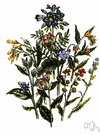gromwell
Also found in: Thesaurus, Encyclopedia, Wikipedia.
grom·well
(grŏm′wəl, -wĕl′)n.
See puccoon.
[Alteration (probably influenced by speedwell) of Middle English gromil, from Old French : gro-, of unknown meaning + mil, millet (from Latin milium; see millet).]
American Heritage® Dictionary of the English Language, Fifth Edition. Copyright © 2016 by Houghton Mifflin Harcourt Publishing Company. Published by Houghton Mifflin Harcourt Publishing Company. All rights reserved.
gromwell
(ˈɡrɒmwəl)n
(Plants) any of various hairy plants of the boraginaceous genus Lithospermum, esp L. officinale, having small greenish-white, yellow, or blue flowers, and smooth nutlike fruits. See also puccoon1
[C13: from Old French gromil, from gres sandstone + mil millet, from Latin milium]
Collins English Dictionary – Complete and Unabridged, 12th Edition 2014 © HarperCollins Publishers 1991, 1994, 1998, 2000, 2003, 2006, 2007, 2009, 2011, 2014
ThesaurusAntonymsRelated WordsSynonymsLegend:
Switch to new thesaurus
| Noun | 1. |  gromwell - European perennial branching plant; occurs in hedgerows and at the edge of woodlands gromwell - European perennial branching plant; occurs in hedgerows and at the edge of woodlandsherb, herbaceous plant - a plant lacking a permanent woody stem; many are flowering garden plants or potherbs; some having medicinal properties; some are pests genus Lithospermum, Lithospermum - annual or perennial herbaceous or shrubby plants; cosmopolitan except Australia |
Based on WordNet 3.0, Farlex clipart collection. © 2003-2012 Princeton University, Farlex Inc.